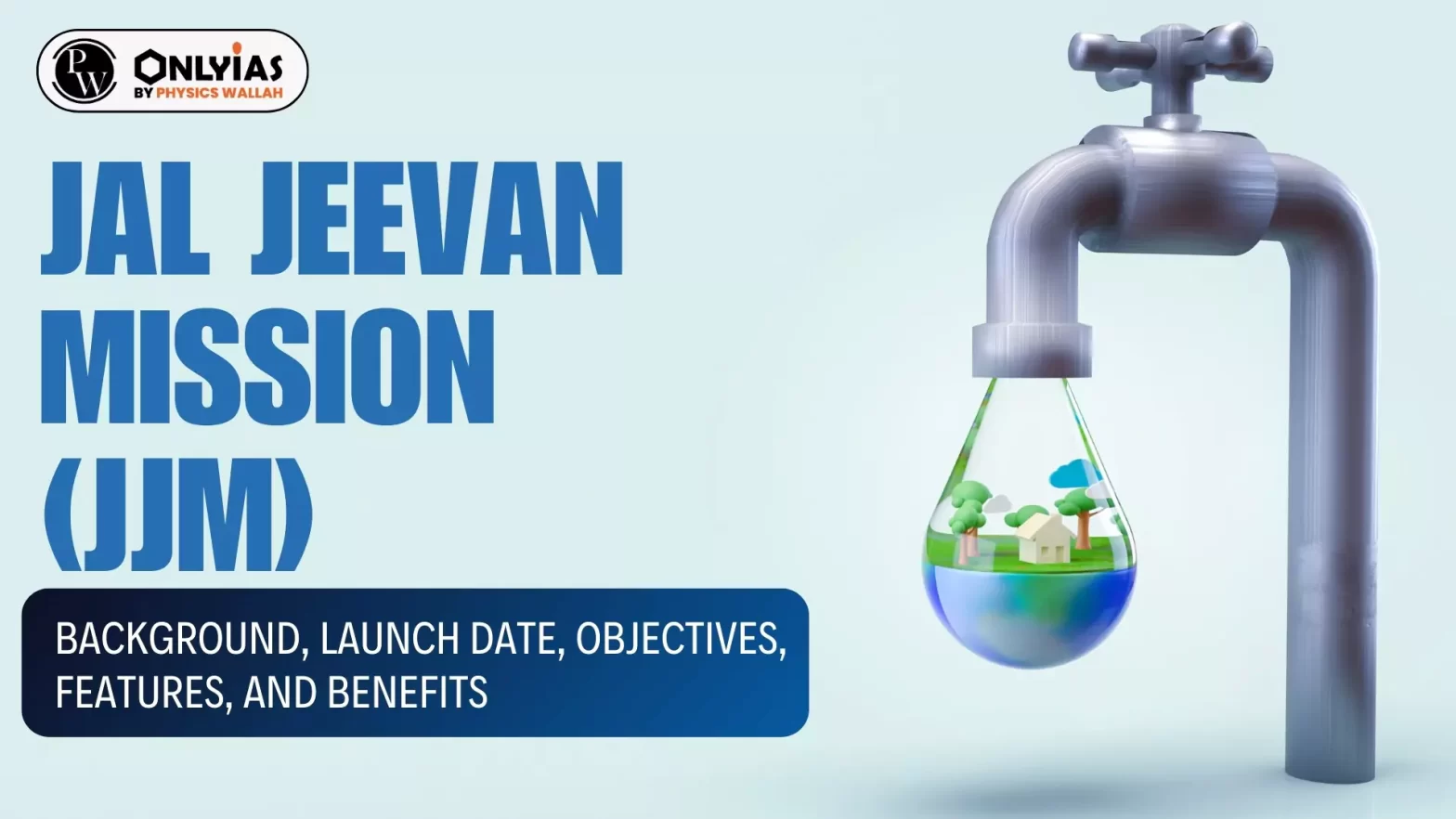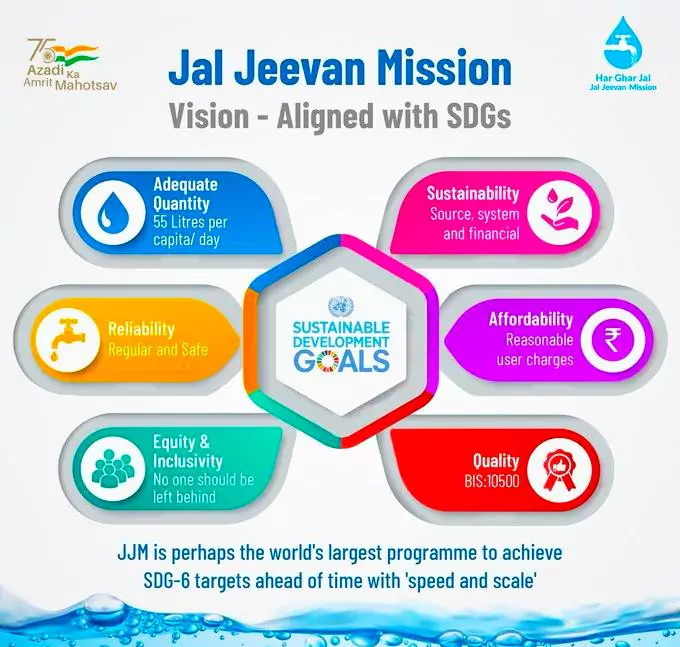Know about Jal Jeevan Mission (JJM): A flagship initiative by the Government of India aimed at providing safe and adequate drinking water to all rural households by 2024. Also learn about its objectives, benefits, financial structure, implementation mechanisms, and significant progress in ensuring water access and sustainability in rural India.

Jal Jeevan Mission (JJM) is a major effort of the Indian government that aims to provide clean and enough drinking water to every rural home via individual household tap connections. Through effective planning and execution, it places a strong emphasis on sustainability, community involvement, and water quality monitoring. Under a single framework, JJM also incorporates and maintains a number of previous water supply and quality initiatives.
Jal Jeevan Mission (JJM) is a flagship initiative of the Government of India aimed at providing safe and adequate drinking water to all rural households by 2024. This programme will also implement source sustainability measures as mandatory elements, such as recharge and reuse through greywater management, water conservation, rain water harvesting.
| Greywater is wastewater from non-toilet plumbing systems such as hand basins, washing machines, showers and baths. If it is properly handled properly, greywater can be safely reused for the garden. |
|---|
Total estimated cost of Jal Jeevan Mission (JJM) is Rs. 3.60 Lakh Crore. Fund sharing pattern between Centre and State
It aims to provide safe drinking water to all rural households by 2024 by supplying 55 liters of water per person per day to every rural household through Functional Household Tap Connections (FHTC) by 2024.
| Tier | Mission | Role |
| National Level | National Jal Jeevan Mission (NJJM) | Headed by a senior officer with a directorate, NJJM will provide policy guidance, financial assistance and technical support to states. |
| State Level | State Water and Sanitation Mission (SWSM) | SWSM would be responsible for coordination, convergence and policy guidance at the state level. |
| District Level | District Water and Sanitation Mission (DWSM) | Headed by Deputy Commissioner/District Collector, DWSM will ensure preparation of village action plan; finalize a district action plan; provide administrative approval of in-village water supply schemes. |
| Village Level | Paani Samiti/Village Water & Sanitation Committee (VWSC)/ User group | The committee will be headed by Sarpanch/ Up-Sarpanch/ Gram Panchayat member/ traditional village head/ senior village leader. |
Here is a SWOT Analysis of Jal Jeevan Mission (JJM);
Strength |
|
Weakness |
|
Opportunities |
|
Threat |
|

JJM now includes several of the continuing schemes that were part of the earlier National Rural Drinking Water Programme (NRDWP), such as:
Rural Water Supply and Sanitation Project for low-income States (RWSSP-LIS): The Rural Water Supply and Sanitation Project for Low Income States (RWSSP-LIS) aims to improve water supply and sanitation in selected rural areas in Assam, Bihar, Jharkhand, and Uttar Pradesh.
National Water Quality Sub-Mission (NWQSM): The National Water Quality Sub-Mission (NWQSM), launched in March 2017, aims to provide safe drinking water to 27,544 arsenic and fluoride-affected rural areas. States were advised to install Community Water Purification Plants as a short-term measure while planning piped water supply for long-term access. Under JJM, these schemes ensure Functional Household Tap Connections (FHTCs) with 55 lpcd water supply to all rural households.
Japanese Encephalitis – Acute Encephalitis Syndrome (JE-AES): It provides clean drinking water through household tap connections in regions impacted by JE-AES. The Ministry of Health and Family Welfare has selected 60 districts most affected by JE-AES. Funds are given to states based on water contamination levels. Under JJM, 0.5% of the budget is used to provide safe piped water and tap connections of 55 lpcd to all rural homes.
Swajal: Swajal is a community-based programme running in aspirational districts to provide safe drinking water through single village water supply systems. Ongoing projects will continue under current guidelines and be completed on time. New projects will be taken up under JJM, and completed Swajal schemes without household tap connections (FHTCs) will be upgraded to meet JJM standards.
Water Quality Monitoring and Surveillance (WQM&S): Regular water quality testing and surveillance using labs and community involvement are part of Water Quality Monitoring and Surveillance (WQM&S). Water quality monitoring includes testing water samples in laboratories and by communities using Field Test Kits. Under JJM, samples are also collected from household taps. The Water Quality Monitoring and Surveillance (WQM&S) program is now part of JJM and gets up to 2% of its funds.
Support activities: All previous NRDWP support activities have been merged into JJM and will receive up to 5% of JJM funds.
If you want to seek assistance from experts and the best resources, consider enrolling yourself in PW online UPSC batches.
Jal Jeevan Mission (JJM) is one of the flagship programmes, aims to provide ‘Functional Household Tap Connections’ (FHTC) to every rural household in the country by 2024.
RJJK is a registered public charitable trust set up by the Department of Drinking Water & Sanitation, Ministry of Jal Shakti, to serve as a receptacle for charitable contributions/ donations and to facilitate such contribution for creation of safe drinking water supply in villages.
The motto of the Jal Jeevan Mission is 'no one is left out', thus ensuring every household irrespective of its socio-economic status, gets tap water supply.
Goa becomes the first ‘Jal Jeevan Mission’ certified state in the country.
Dadra & Nagar Haveli and Daman & Diu is the first ‘Har Ghar Jal’ certified Union Territory in India.
<div class="new-fform">
</div>